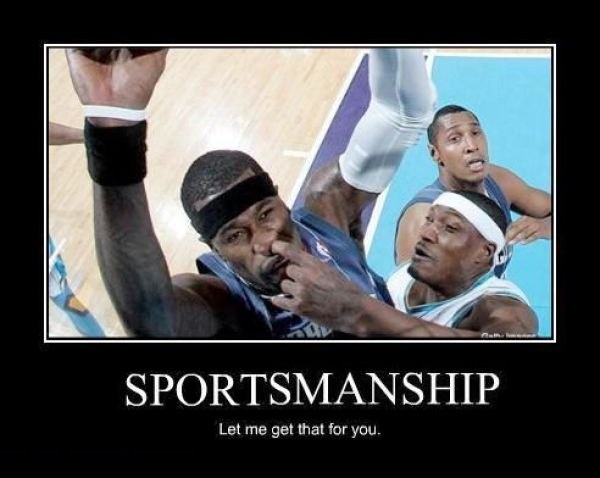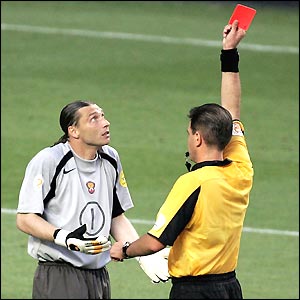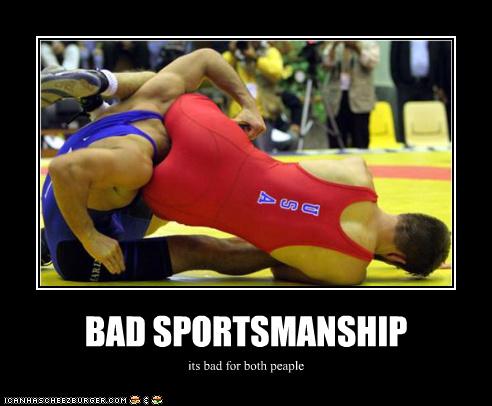EDITORIAL: The Thorny Issue of Sportsmanship

Howdy everyone, Duke here from Dukes inferno. Well, this morning I got to thinking about tournaments and how they compare to sporting events. More specifically, I began to think about sportsmanship scores in general and how they are implemented into events.
As I began to delve into this topic I began to think about the complaints you here from players on the topic.
Chipmunking:
 |
| Chipmunking is never cute, ever… Seriously. |
“HE CHIPMUNKED ME! WHAT A JERK!” is something we have all heard once or twice. If you have played enough tournaments you have probably been on both sides of the argument. Usually it is also thrown in there that the guy did it simply because you gave him the beating of his life and he wants you to lose as many points as you can. This is one of the classic and most common issues brought up against having the opponent score your sportsmanship.
Always room for improvement:
You know this guy (he might even be you.) This is your buddy who never rates women a “10,” he never gives a movie “5 stars.” On surveys he always selects “pleased,” instead of “very pleased.” No concert is ever “THE BEST EVER!” Why? It isn’t because he thinks something was really imperfect with the thing he is judging, it is because there is “always room for improvement.” Though he is kind of right, I suppose the movie could have had more explosions; and the shower in the hotel could have been 100% gold, or Flogging Molly could have invited him onstage to do a sing along, instead of leaving him just backstage… But it didn’t happen and as such he rated the whole thing a 9.95. No matter how nice you are and how accommodating an opponent you are this game will never garnish perfect sportsmanship… Unless you want to file those bunions!
Scratch my back and I’ll scratch yours:
 |
| Scratch my back and the golden rule all in one! |
I can’t count the number of times I have been filling out a score sheet after the game and in the corner of my eye I see the opponent stop writing as he gets to the sportsmanship score. Sometimes, if I’m feeling frisky I stop at my own sportsmanship score just to make sure he is fact waiting for me. I usually circle what I feel the game truly was but the funny thing is that almost every time I do this my score is identical to the one that I gave. There have been many game where I know I have been a complete jerk and the other guy was 100% accommodating I gave him a “Great,” and sure enough a “Great,” shows up on my card too. Sometimes this is done and they give you a score of one less than what you give. This is called “Scratch my back and Ill chipmunk yours.” or SMBCY for short.
Well, if we have been over the complaints perhaps we should go over some of the pros:
 The golden rule:
The golden rule:
Sportsmanship is the only area where you as a player have a voice in the score of another player. If they are truly unsportsmanlike or rude you have a viable way to express your distaste for their actions. In a perfect world people are fair and understanding and score people with the same stick and everyone is given an understandable score.
Check yourself before you wreck yourself:
If you’re having a rough day, or are feeling not-so-good from a long night of imbibing spirits you might be a little on edge. Usually, after seeing your first bad sportsmanship score you realize you have to check yourself or your going to not have a pleasant rest of the weekend. Not just because you’ll likely not finish as high as you wanted, but also because you’ll likely piss of lots of people in the coming games.
Possible ideas:
Well, if the things we like about sportsmanship scores are people using the golden rule and players keeping their attitudes in check then perhaps we should consider some alternate ideas for scoring sportsmanship that will implement these behaviors. (note: this isn’t a suggestion of a ‘better,’ system… this is just throwing ideas out there)
 |
| Oh, NOW you act innocent?! |
Idea 1: Three strikes and you’re out/ The red card – Remember when the Giants Left tackle helped lift up the Patriots Nose Guard in the Super Bowl and they were awarded 1 point? No? Well, thats cause Sports don’t have good/bad behavior affect your score. Playing nice is just a part of the game and if you are a jerk then you can be penalized or even kicked out, but your score isn’t affected.
Think of this strategy. A valid and serious complaint comes in from a player about another player (or from a judge); after making sure it is indeed valid and after determining how serious the infraction is you talk to the player in question and give them a stern warning to clean up their attitude (strike one). After the second serious complaint is given and determined to be valid the player receives a % deduction (10%, 20%, 100%???) from his round score and is again warned to “watch their attitude,” (strike two). On the third serious complaint the player is simply asked to leave the event. (strike three). I like this system because the player has a chance to clean up their act, and it doesn’t allow any of the complaints that the current systems sees. However, it requires a strict TO who is willing to be the bad guy and it also is a little subjective as to what is a ‘serious,’ infraction. Is forgetting rules a serious enough infraction? What about slow play?
Idea 2: Checklist – The sportsmanship score of players is determined by a series of questions answered by your opponent that can be verified. “Did your opponent manage time properly, i.e. not play slow and showed up on time at the table Y/N?” “Did your opponent have all materials to play their army i.e. tape measure, dice, FAQ, codex, Rulebook Y/N?.” This questionnaire could ask all the important questions and then give a score based on the answers. As a good point it does allow room for the players to discuss what actually is affecting their score “No, I do have the FAQ right here…see.” This style gets rid of “chipmunnking” and “room for improvement,” but “scratching the back is still present.” It also takes a lot of time if the checklist is too long.
At Feast of Blades we use both systems, we use a variation of the three strikes and your out on our more competitive “Invitational,” while our more relaxed/ hobby tournament “The 40k Open,” uses the checklist. We do it this way because the Invitational uses a hybrid win/loss system and the Open GT is like the golden age GW GT’s with lots of soft scores, as such we wanted to know what exactly someone did or did not to to affect their soft scores so directly and a checklist system works very well for that, also each check listed item adds to your score, which works great for a Battle Points GT.
 |
| In conclusion |
Well, now I have been over some issues and possible solutions to Sportsmanship, what do you think is a good way to handle sportsmanship? I know that this article isn’t all-encompasing and it isn’t meant to be, so lets hear your ideas!
Duke



